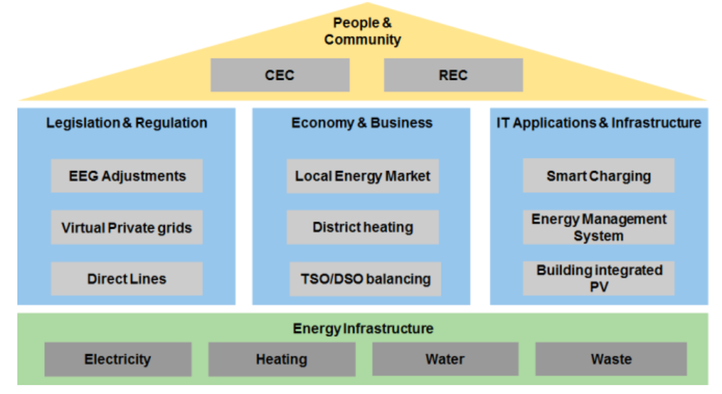Secure, clean and efficient Energy - RENergetic
Introduction
Title: Community-empowered Sustainable Multi-Vector Energy Islands
Coordinator: Inetum (Spain)
Partners: University of Pavia (Italy), Ospedale San Raffaele (Italy), Energie Kompass (Austria), University of Passau (Germany), Ghent University (Belgium), University of Mannheim (Germany), Poznan University (Poland), Veolia (Poland), Segrate (Italy), Clean Energy Innovative Projects (Belgium), Poznan Supercomputing and Networking Center (Poland)
Duration: 42 months
Start date: 1 November 2020
Project description
The current EU ‘Clean Energy Package’ aims to place local consumers at the heart of the energy transition. In the context of local energy systems with a weak or non-existing grid connection this implies to give the power of operating a renewable- based energy infrastructure to the local people, energy consumers and producers. Private people and organizations should be involved to establish energy island communities, which are based on self-management and -operation. Simultaneously, those communities will improve social cohesion and technical optimization of all energy vectors existing in the specific energy island.
The goal of RENergetic is to integrate and demonstrate solutions that will foster a substantial increase of 1) energy efficiency and 2) the level of renewable energies and energy autarky by integrating three main energy vectors (electricity, heat, waste) in three heterogeneous urban energy islands, with an early involvement of the communities and a long-term economic viability: The New Docks in Ghent, Belgium (energy-aware housing), the Warta Campus in Poznan, Poland (data center heat for a campus) and the Hospital and Research campus in Segrate-Milan, Italy (demand response, including electric vehicles). This transdisciplinary endeavor is supported by innovative activities in all relevant areas. On the technical level, optimization and demand response approaches for cross-sector scenarios are combined in a hierarchical approach. This concept integrates innovative smart control strategies and machine learning based-forecasting methods. A thorough regulation analysis feeds into the creation of novel business models, market strategies and value networks on the economic and legal level. This ensures seamless integration with existing energy management systems and cooperation with external networks. Finally, an iterative approach of empowering the energy island communities with participatory structures will be applied on the social level.
Objectives
These are the objectives of RENergetic:
- To securely maximize the level of energy autarky of a local energy system (energy island) and its share of renewable energy sources at energy consumption, at the same time.
- To create energy island communities with formal underpinnings and a high level of personal identification that support a high intake of renewable energy sources in autarch energy islands.
- To enhance the economic attractiveness of renewable-based and autarch local energy systems (energy islands).
Role of Ghent University
UGent participates in RENergetic with in total 3 research teams belonging to 2 research groups:
IDLab
Techno-Economic Research team (lead: prof. Sofie Verbrugge)
Role: Economic valuation of the needs for local stakeholders, evaluation and comparison of the different pilots from an economic perspective including a market analysis and business models identification, and the development of the replicability methodology.
AI for Smart Grids team (lead: prof. Chris Develder)
Role: Design and development of innovative control strategies and optimizers for specific energy vectors and a global optimizer taking multiple objectives over different energy vectors into account. Deployment and evaluation of the designed control strategies in the pilot New Docks in Ghent and support for replicability by designing the necessary interfaces for an easy deployment in other environments.
The Centre for Environmental and Energy Law (lead: prof. Frederik Vandendriessche)
Role: evaluate and compare the different pilots from a legal perspective and formulate recommendations for the replication of energy islands.
Website
Contact
Prof. Sofie Verbrugge
Department INTEC, research group IDLab
Phone number: +32 9 331 48 80
E-mail
Prof. Chris Develder
Department INTEC, research group IDLab
Phone number: +32 9 331 49 61
E-mail
Prof. Frederik Vandendriessche
Department of European, Public and International Law
Phone number: +32 9 264 69 09
E-mail
